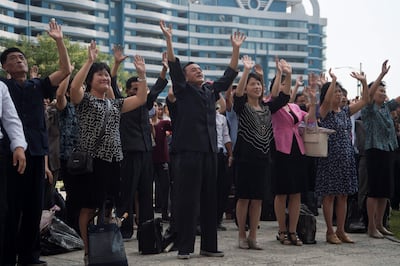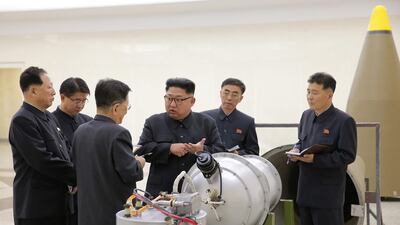Unpredictable is a tag often applied to North Korea.
Sometimes it is true. Yet often the opposite obtains.
The Democratic People’s Republic of Korea (DPRK) can be drearily, if dangerously, predictable in its provocations. Never more so than now, with its vaunted test of a hydrogen bomb: its sixth nuclear test since 2006, including two last year.
The scale of the seismic tremor – 6.3 on the Richter scale, felt in Vladivostok and causing chandeliers to sway in Yanji across the border in China – seems to confirm that this was indeed an H-bomb. Pyongyang had claimed the same a year ago, but outsiders were sceptical.
Baleful though it is, we had been waiting for this second shoe to drop.
You can’t have one without the other, or not usefully. A fully functional and credible nuclear deterrent needs two elements: a miniaturised nuclear warhead, and intercontinental ballistic missiles (ICBMs) capable of delivering this and striking enemies wherever they be.
North Korea has been steadily working on both prongs for more than two decades. The pace of these efforts has quickened markedly since the young, untried and reportedly hot-headed Kim Jong-un succeeded his father Kim Jong-il on the latter’s death in December 2011.
After a flurry of missile tests this year, including two ICBMs probably able to reach the US in July alone, it was time for a fresh nuclear test.
________________
Read more:
Japan government confirms North Korea conducted nuclear test
North Korea says missile launch is 'prelude' to containing Guam
________________
Spy satellites had long shown North Korea's test site, at Punggye-ri in the north-east, primed for use at short notice. And so it has proved.
They even gave a strong hint in advance. Just hours before the test, the official Korean Central News Agency (KCNA) showed Mr Kim talking with scientists next to what it said was a missile-ready hydrogen bomb warhead with “great destructive power”.
Pyongyang tends to jump the gun it is brandishing. Whether it can in fact yet miniaturise and mount such a warhead, and deliver it reliably and accurately, remains to be seen.
But to wait and see would be perilously complacent; and complacency has prevailed for too long regarding North Korea. Barack Obama’s policy of "strategic patience" – doing nothing, in effect – now looks like criminal negligence while a clear and present danger brewed.
Yet unstrategic impatience is even worse. That is what we have now in Washington.
US president Donald Trump spews fierce rhetoric in best Pyongyang fashion, with occasional honey to confuse the message. This is no kind of policy.
Mr Trump’s more experienced and responsible cabinet colleagues are left to pick up the pieces: scrambling to reassure allies – especially an anxious South Korea – that their supposed protector is not about to over-react to Mr Kim’s provocations by unilaterally endangering the very peace which has kept the Republic of Korea safe and free for two-thirds of a century.
Diplomacy is urgently needed, yet Mr Kim’s H-bomb makes that all the harder.
His father and grandfather, shrewder provocateurs, knew when to balance threats by tossing a sop to the foe.
They said, or pretended, that denuclearisation was negotiable.
Kim Jong-un by contrast has written the North's nuclear status into its constitution. That makes things very difficult for those still hoping to preserve the tattered Nuclear Non-Proliferation Treaty (NPT).

Pyongyang is by no means the world’s first or sole nuclear miscreant. But Israel, India and Pakistan never joined the NPT. Only North Korea joined, played along – and then quit when the International Atomic Energy Agency's strictures became inconvenient.
Yet North Korea is arguably one of a kind, and its bomb is now a fact.
Its main motives have always been defensive. Seeing what happened to Iraq’s Saddam Hussein, who turned out not to have weapons of mass destruction, and Libya’s Muammar Qaddafi who gave them up, only strengthened the Kims’ resolve to avoid the same grim fate.
Having the bomb provides that guarantee.
But this Kim, unlike his father, risks pushing his luck too far.
North Korea has long seen by the world in Tom and Jerry terms. Yet in the real world, unlike a cartoon, jabbing too hard and often gleefully at the big cat is not smart. Anger and wounded pride might make it lash out.
But how? The pithy executive summary provided by Mr Trump’s sacked strategy director is spot-on.
Skewering the official mantra that all options are on the table, Steve Bannon noted that the vulnerability of millions of people in Seoul to North Korean retaliation rules out any military strike. As he summed it up: "They got us."
Meanwhile Mr Trump, incredibly, is reportedly mulling pulling out of – not even renegotiating – the free trade agreement with South Korea that George W Bush signed just a decade ago.
Just the way to reassure new left-leaning president Moon Jae-in that the US really is on South Korea's side in their hour of need.
What a mess. One can but hope that common sense and peace will prevail. But with such ham actors and a dodgy florid script, who can be sure how this unsettling melodrama will end?

